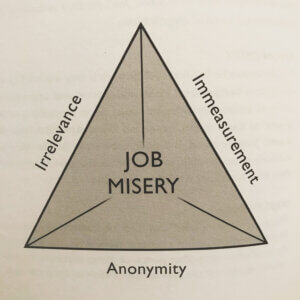When you started as a youth pastor, I’d bet you had high, high hopes. Odds are good that you had a great experience in a youth group or student ministry when you were growing up and you wanted to recreate that experience for the next generation of students. Besides that, you really loved Jesus and wanted to help teenagers love Jesus too.
Who knows? Maybe you imagined that life on a church staff, going to work in a church office, would give you a chance to experience the spiritual highs of summer camp. Mornings spent in the Word and prayer. Conversations about how to be fully devoted to Jesus and overcome the sins that trip us up. Worship music playing around the clock.
And then, well, you joined a church staff and went to work in a church office. And you realized that working at a church is more like a J-O-B than you thought it would be.
Or maybe I’m just projecting my own thoughts onto you.
Either way, an image from one of Patrick Lencioni’s books, The Three Signs of a Miserable Job (it’s since been republished as The Truth About Employee Engagement but I like the first title better) has helped me understand more about my feelings at various points in my career as a youth pastor.
Here it is:

I often wondered (and maybe you do too): Why didn’t the new job turn out to be as amazing as I’d hoped? Or, when times were good, why did I feel more satisfied in this role than my last one?
The answer to both questions is the same. It has little to do with pay. It’s a factor, to be sure, but not a major one when it comes to satisfaction at work. Surprisingly, at least to me, the answer also has little to do with the actual work being done. After all, you can be miserable as a youth pastor at one church and then be totally satisfied as a youth pastor at another church. The work is technically the same, so that’s not the deciding factor in your satisfaction.
Instead, your satisfaction (or lack of it) often comes down to three specific factors: Anonymity, Irrelevance, and Immeasurement.
Think about it:
• Are you affirmed as an individual and appreciated for your specific contributions? Or, do you feel anonymous, invisible, and taken for granted?
• Are you reminded how much your work makes a difference for someone else? Or, do you feel like your work is mostly irrelevant and disconnected from the bigger picture?
• Are you able to measure your results in tangible, objective ways? Or, do you feel like you’re aiming at vague, subjective targets?
Your answers to these questions will tell you a lot about why you currently love or loathe going to work.
Your Move
If you’re currently in a miserable youth ministry job, think about ways that you can overcome these obstacles. You could be more intentional about building friendships with other staff members or ministry volunteers. You could ask your volunteers to be more proactive about asking students to share about the difference your ministry is making in their lives. You could establish clear goals in the areas that you believe matter most.
As far as it’s within your control, tailor your work to overcome the obstacles of anonymity, irrelevance, and immeasurement. If you don’t, you’ll eventually be miserable in whatever job you’re doing, no matter where you go.
Suggested Resource:
Latest posts by Trevor Hamaker (see all)
- 7 Ways to Deal with Disruptive Students - December 18, 2024
- Fighting Frustration by Shifting Your Focus - December 18, 2024
- What is the Most Important Job of a Small Group Leader? - December 18, 2024
Did You Like This Post?
Sign up to get updates sent to your inbox each week!
You're in! Want more ideas and support for your ministry? Check out the BYM Community!
http://bit.ly/bymcommunity


